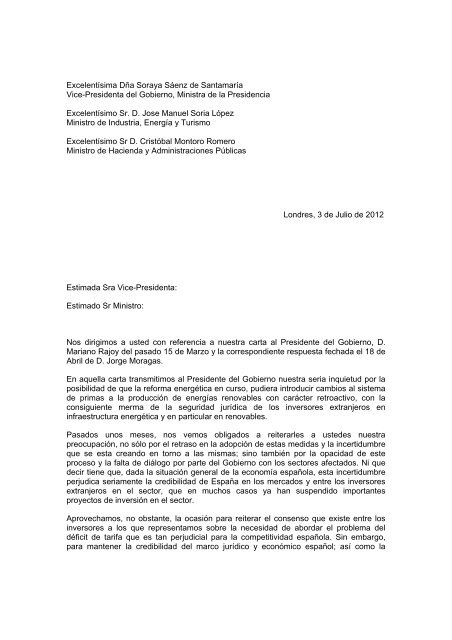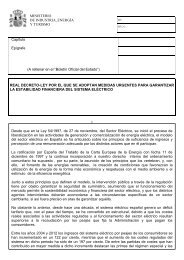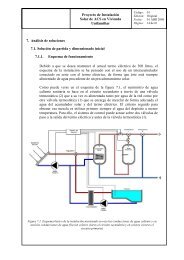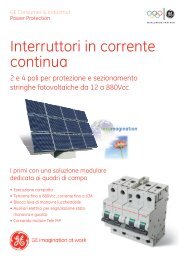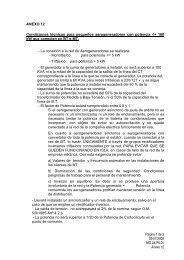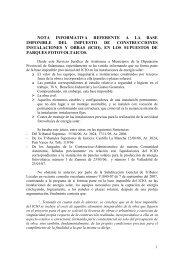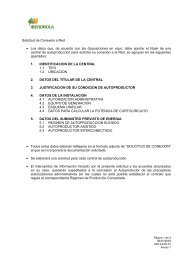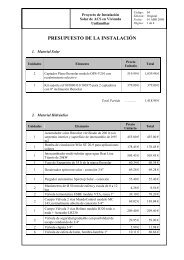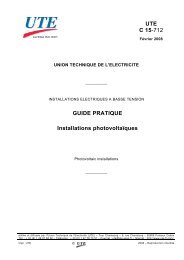A Infra Spain letter spainish government 04.07.12.pdf - Solarweb
A Infra Spain letter spainish government 04.07.12.pdf - Solarweb
A Infra Spain letter spainish government 04.07.12.pdf - Solarweb
You also want an ePaper? Increase the reach of your titles
YUMPU automatically turns print PDFs into web optimized ePapers that Google loves.
Excelentísima Dña Soraya Sáenz de Santamaría<br />
Vice-Presidenta del Gobierno, Ministra de la Presidencia<br />
Excelentísimo Sr. D. Jose Manuel Soria López<br />
Ministro de Industria, Energía y Turismo<br />
Excelentísimo Sr D. Cristóbal Montoro Romero<br />
Ministro de Hacienda y Administraciones Públicas<br />
Londres, 3 de Julio de 2012<br />
Estimada Sra Vice-Presidenta:<br />
Estimado Sr Ministro:<br />
Nos dirigimos a usted con referencia a nuestra carta al Presidente del Gobierno, D.<br />
Mariano Rajoy del pasado 15 de Marzo y la correspondiente respuesta fechada el 18 de<br />
Abril de D. Jorge Moragas.<br />
En aquella carta transmitimos al Presidente del Gobierno nuestra seria inquietud por la<br />
posibilidad de que la reforma energética en curso, pudiera introducir cambios al sistema<br />
de primas a la producción de energías renovables con carácter retroactivo, con la<br />
consiguiente merma de la seguridad jurídica de los inversores extranjeros en<br />
infraestructura energética y en particular en renovables.<br />
Pasados unos meses, nos vemos obligados a reiterarles a ustedes nuestra<br />
preocupación, no sólo por el retraso en la adopción de estas medidas y la incertidumbre<br />
que se esta creando en torno a las mismas; sino también por la opacidad de este<br />
proceso y la falta de diálogo por parte del Gobierno con los sectores afectados. Ni que<br />
decir tiene que, dada la situación general de la economía española, esta incertidumbre<br />
perjudica seriamente la credibilidad de España en los mercados y entre los inversores<br />
extranjeros en el sector, que en muchos casos ya han suspendido importantes<br />
proyectos de inversión en el sector.<br />
Aprovechamos, no obstante, la ocasión para reiterar el consenso que existe entre los<br />
inversores a los que representamos sobre la necesidad de abordar el problema del<br />
déficit de tarifa que es tan perjudicial para la competitividad española. Sin embargo,<br />
para mantener la credibilidad del marco jurídico y económico español; así como la
confianza de los inversores extranjeros en el sector, es fundamental que las medidas<br />
que se tomen para reducir el déficit de tarifa no tengan – como fue el caso de las<br />
medidas tomadas por el Gobierno anterior - carácter retroactivo o produzcan<br />
efectos similares por ser discriminatorias para la energía renovable. Medidas que<br />
no cumplan esos requisitos tendrían consecuencias nefastas para la “marca España”<br />
que su Gobierno tanto se esfuerza en potenciar.<br />
Con respecto a la retroactividad, subrayar que es un tema esencial para los inversores<br />
financieros, que además no hacen la distinción entre retroactividad propia e impropia,<br />
sino que consideran la retroactividad en su sentido más amplio; es decir, como<br />
cualquier medida, incluidas las de tipo fiscal, que afecte a proyectos ya registrados.<br />
Con esto en mente, seguimos pensando que cualquier solución de carácter fiscal -<br />
como un posible impuesto sobre la generación eléctrica – sólo sería aceptable si se<br />
aplica a todas las tecnologías, es decir no es discriminatorio – y si la base imponible es<br />
el MWh y no – como se ha sugerido – el volumen de ingresos de los operadores o la<br />
eficiencia de la instalación generadora. Así, un impuesto de estas características,<br />
constituiría una reducción implícita (y por tanto retroactiva) de las primas a las<br />
renovables ahora en vigor. Una medida de estas características, dañaría la viabilidad<br />
futura de España como receptor de nuestras inversiones y abriría la puerta a acciones<br />
legales por nuestra parte que en nada benefician a ninguna de las partes implicadas.<br />
En ese sentido, la idea que se ha sugerido desde algunos ámbitos de introducir un<br />
impuesto o tasa de x€/MWh a todas las tecnologías tanto renovables como<br />
convencionales - aun no siendo una solución ideal al cambiar el marco financiero de los<br />
inversores- nos parece razonable al no ser discriminatoria. Otra posibilidad que ya<br />
apuntamos a sus servicios en su momento, sería introducir un impuesto como el<br />
introducido en Italia, la llamada “tasa Robin Hood”, que nos parece un buen modelo<br />
puesto que refleja los principios arriba indicados al no gravar los ingresos sino los<br />
beneficios netos. Ambas posibilidades serían más acordes con la línea propuesta por la<br />
Comisión Europea en su Comunicación del 6 de Junio pasado sobre las energías<br />
renovables y en la que pone en guardia a los Estados Miembros contra la adopción de<br />
medidas fiscales diseñadas para desincentivar la inversión en renovables.<br />
Con respecto a la no discriminación, seria útil clarificar aquí un punto recurrente en<br />
este debate y que a nuestro entender refleja cierta incomprensión sobre el<br />
funcionamiento de las inversiones en infraestructuras de energía renovable. Nos<br />
referimos a la creencia general de que estas inversiones disfrutan de una rentabilidad<br />
excesiva o al menos muy superior a la de otras inversiones en infraestructura<br />
energética. La inversión en este sector – y en particular la inversión extranjera - se ha<br />
hecho fundamentalmente en activos ya en operación y por los que se pagaron, a sus<br />
promotores originales, unas cantidades que suponían casi siempre unos retornos<br />
implícitos muy ajustados, y que a su vez, reflejaban el bajo riesgo propio de invertir en<br />
un marco jurídico estable y seguro como ha sido hasta ahora España. Por lo tanto,<br />
aunque las inversiones de los promotores iniciales de estos proyectos pudieran haber<br />
sido muy rentables en algunos casos, no es ese el caso de las de los inversores<br />
extranjeros.<br />
Finalmente, es profundamente preocupante la idea de que los ingresos fiscales<br />
generados por un posible “céntimo verde” u otro tipo de impuesto sobre la generación<br />
eléctrica, pudieran utilizarse para la reducción del déficit público en vez de para la
esolución del déficit de tarifa. Claramente, si ese fuera el caso, la reforma se cerraría<br />
en falso al no resolver el principal problema del sector y la incertidumbre para la<br />
inversión se dispararía ante la expectativa de futuros nuevos cambios y reformas al<br />
sistema.<br />
La seguridad y la estabilidad del marco regulatorio es una garantía esencial para atraer<br />
inversión extranjera. El deterioro de la de seguridad jurídica que traerían consigo<br />
medidas de carácter retroactivo y/o discriminatorio, sería incomprensible en un país<br />
miembro de la Unión Europea. Es imperativo por lo tanto, que esta reforma, se lleve a<br />
cabo preservando la estabilidad del marco jurídico español y la seguridad jurídica de los<br />
inversores que tan necesarios son para la salida de la crisis.<br />
Espero que estas reflexiones les sean de utilidad. En cualquier caso, quedamos a su<br />
entera disposición para discutir personalmente estas preocupaciones.<br />
Agradeciéndoles de antemano su interés, les saludan atentamente<br />
Bernardo Sottomayor<br />
Managing Director, Head of Acquisitions<br />
RREEF <strong>Infra</strong>structure Europe<br />
Mark Crosbie<br />
Managing Partner<br />
Antin <strong>Infra</strong>structure Partners<br />
Anexo:<br />
Copia:<br />
Inversores representados<br />
Sr D. Jorge Moragas Sánchez, Director del Gabinete del Presidente del<br />
Gobierno<br />
Sr D. Álvaro Nadal Belda, Director de la Oficina Económica de la<br />
Presidencia del Gobierno.<br />
Ms. Ellen Lenny-Pessagno, Embassy of the United States<br />
Mr. Matthew Desoutter, Embassy of the United Kingdom<br />
Mr. Jan Alderliesten, Embassy of the Netherlands<br />
Mr. Philippe O’Quinn, Embassy of France<br />
Mr. Thomas Neisinger, Embassy of Germany
Group of international investors represented<br />
Assets Under Management in excess of €320bn<br />
End-investors (pension funds, life insurers, sovereign wealth funds and banks) with<br />
assets worth several € trillions<br />
Assets held in <strong>Spain</strong> worth in excess of €9bn<br />
Ampere Equity Fund<br />
Investment Fund specialized in renewable energy projects in Europe, in Wind, Solar and<br />
Biomass technologies. The fund has a committed capital of EUR 320 million. Its core<br />
investors are the Dutch <strong>government</strong> pension funds APG and PGGM, and financial<br />
institutions Delta Lloyd and Rabobank. These investors manage assets in excess of EUR<br />
400 billion. Ampere’s investments in <strong>Spain</strong> include wind energy and solar energy assets.<br />
Antin <strong>Infra</strong>structure Partners<br />
Antin <strong>Infra</strong>structure Partners (Antin IP) is a €1.1bn fund with a focus on investing in<br />
energy, transport and telecom infrastructure assets in Europe and in particular the eurozone.<br />
Its investors are leading Scandinavian, UK, Swiss, German, French, Canadian and<br />
Australian pension funds, life insurers and banks. Antin IP has made two investments in<br />
<strong>Spain</strong>: Andasol 1&2 (two operating thermosolar plants with a total capacity of ca.<br />
100MW) and Axion (second largest telecom tower company in <strong>Spain</strong>).<br />
Cube <strong>Infra</strong>structure<br />
Cube <strong>Infra</strong>structure Fund is a Luxembourgian SICAV which invests in private equity in<br />
the infrastructure sector in Europe on behalf of investors worldwide. Natixis is the largest<br />
investor as well as the main shareholder of the management company. Assets under<br />
management total c. €1bn. Investments in <strong>Spain</strong> include mini-hydro plants in <strong>Spain</strong><br />
(84MW), three solar plants (6MW) and sub-marine cables between Mainland <strong>Spain</strong> and<br />
Canaries islands and Balearic islands<br />
Eiser <strong>Infra</strong>structure Partners<br />
EISER <strong>Infra</strong>structure (“EISER”) is a London based independent infrastructure fund<br />
manager, which was previously part of ABN AMRO Bank NV. EISER’s first fund had<br />
€1.1bn of capital commitments and is now fully invested in a diversified portfolio of 11<br />
operating and development assets with a combined enterprise value above €3bn. In<br />
<strong>Spain</strong>, it invested in three thermal solar plants as well as four transport concessions in<br />
Madrid, Valencia and Murcia. Its investor base comprises mainly pension funds and
insurance companies from Europe and Japan. EISER is now raising its second fund with<br />
a target size of €1bn<br />
HgCapital<br />
HgCapital is a sector expert private equity investor. Based in London and Munich,<br />
HgCapital manages several funds amounting to ca. €4bn behalf of some of the world’s<br />
leading institutional and private investors. HgCapital invests in expanding segments of<br />
the Healthcare, Industrial, Services, TMT and Renewable Energy sectors across Western<br />
Europe. Its top-performing listed investment trust, HgCapital Trust, is listed at the<br />
London Stock Exchange and invests alongside the private equity funds.<br />
HgCapital has been present in <strong>Spain</strong> since 2008, having made investments in the<br />
photovoltaic and hydroeletric sectors.<br />
<strong>Infra</strong>red Capital Partners<br />
<strong>Infra</strong>Red Capital Partners is a Fund Manager which invests in private equity in the<br />
infrastructure and property sectors on behalf of investors from Europe, Asia and the<br />
Middle East. HSBC is the largest investor in both the business and the funds. Assets<br />
under management total c. $5bn. Investments include two Concentrated Solar Power<br />
projects in <strong>Spain</strong>, both of which are in construction and due for completion / inscription<br />
this year<br />
KGAL<br />
With assets under management of €25bn, predominantly invested in the areas of real<br />
estate, aviation, infrastructure and ships, KGAL is one of the leading asset managers in<br />
Germany and has more than 40 years of experience in making long-term real capital<br />
investments with sustainable and stable yields. Our portfolio of services encompasses the<br />
design and management of selected retail and institutional funds as well as investment<br />
solutions for family offices and foundations. KGAL's portfolio of Spanish investments<br />
amounts to €600bn, mainly in the renewable energy sector.<br />
KKR<br />
KKR is a leading global investment firm with deep roots in private equity, diversified<br />
capabilities, and an impressive track record. With 14 offices around the world, KKR<br />
manages assets through a variety of investment funds and accounts covering multiple<br />
asset classes. Assets under management totalled $59bn as of December 31, 2011. KKR<br />
seeks to create value by bringing operational expertise to its portfolio companies and<br />
through active oversight and monitoring of its investments. KKR complements its<br />
investment expertise and strengthens interactions with investors through its client<br />
relationships and capital markets platform. As investors with an industrialist vision, KKR<br />
thinks long-term, pursues the highest standards of excellence, and aligns its interests with<br />
those of all its investment partners by putting significant capital behind investment ideas.<br />
MEAG
MEAG is the asset manager for Munich Re and ERGO Insurance Group. In addition to<br />
managing the Group's own assets, we also work for other partners outside the Group.<br />
With management units in New York and Hong Kong and managed assets amounting to<br />
around €216bn (31 December 2011), we are one of Europe's leading asset management<br />
companies. MEAG manages around €2,0bn in mutual funds for private investors (31<br />
December 2011).<br />
RREEF <strong>Infra</strong>structure<br />
RREEF <strong>Infra</strong>structure is the infrastructure investment business of Deutsche Bank’s Asset<br />
Management division (“DeAM”) and one of the largest infrastructure investment<br />
managers globally with funds under management of €7.8bn (as of 31 December 2011).<br />
DeAM itself is one of the largest asset managers in the world with €548bn in assets under<br />
management worldwide (as of 31 January 2012).<br />
RREEF <strong>Infra</strong>structure manages third party co-mingled investment funds, whose investors<br />
include major pension funds and insurance companies from Europe, North America, Asia<br />
and Australia.<br />
In <strong>Spain</strong> RREEF <strong>Infra</strong>structure has made six investments to date, including three<br />
investments in the renewable sector : a 200MW wind farm in Castilla y Leon, Andasol<br />
1&2, two operating thermosolar plants with a combined capacity of ca. 100MW and<br />
Arenales, a ca. 50 MW thermosolar plant currently under construction. Other investments<br />
are Autovia del Camino in Navarra and stakes in the LNG terminals of Bilbao and<br />
Sagunto. RREEF is also a leading investor in the real estate sector and has realised<br />
numerous landmark transactions in <strong>Spain</strong>, including the sale and lease-back of a large<br />
portfolio of branches from BBVA.<br />
Riverstone Holdings (through AES Solar)<br />
AES Solar is a joint venture of The AES Corporation (NYSE: AES) and Riverstone<br />
Holdings LLC. Back in 2008 both companies announced their intention to commit up to<br />
$1 billion to develop a global platform of utility-scale solar photovoltaic (PV) projects.<br />
Under terms of the agreement, AES, one of the world’s largest global power companies,<br />
and Riverstone, a New York-based energy and power-focused private equity firm, will<br />
each provide up to $500 million of capital over five years to invest in PV solar projects<br />
around the world. Today AES Solar has more than 250MW of PV projects in operations<br />
or under construction. Out of the 250 MW, 32MW are located in <strong>Spain</strong>


